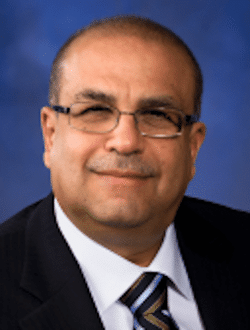Biography
Raafat Mansour is a Professor of Electrical and Computer Engineering at the University of Waterloo and holds Tier 1- Canada Research Chair (CRC) in Micro-Nano Integrated RF Systems. He held an NSERC Industrial Research Chair (IRC) for two terms (2001-2005) and (2006-2010). Prior to joining the University of Waterloo in January 2000, Dr. Mansour was with COM DEV, a global manufacturer of space hardware in Canada, over the period 1986-1999, where he held various technical and management positions in COM DEV’s Corporate R&D Department. Professor Mansour holds 42 US and Canadian patents and more than 400 refereed publications to his credit. He is a co-author of the highly successful Wiley book “Microwave Filters for Communication Systems, Fundamentals, Design and Applications,” an in-depth look at the state-of-the-art in microwave filter design, implementation, and optimization. He has also contributed 6 chapters to four other books. Professor Mansour founded the Centre for Integrated RF Engineering (CIRFE) at the University of Waterloo https://uwaterloo.ca/centre-integrated-rf-engineering/. It houses a clean room and a highly advanced RF test and characterization laboratory. He served as the Technical Program Committee (TPC) Chair of the 2012 IEEE International Microwave Symposium (IMS). Professor Mansour is a Fellow of the IEEE, a Fellow of the Canadian Academy of Engineering (CAE), a Fellow of the Engineering Institute of Canada (EIC). He was the recipient of the 2014 Professional Engineers Ontario (PEO) Engineering Medal for Research and Development and the 2019 IEEE Canada A.G.L. McNaughton Gold Medal Award.
Presentations
Multi-Function Multi-Band Reconfigurable High-Q Filters
Reconfigurable filters are key components in the development of agile multi-standard receivers. The advent of innovative switched capacitor arrays and switch technologies based on Silicon on Sapphire, Micro-Electro-Mechanical Systems (MEMS) and Phase Change Material (PCM) technologies permits the development of a new generation of high linearity, low loss, and low power consumption tunable components. In this new generation of reconfigurable microwave front-ends, microwave reconfigurable filters are among the most critical and challenging components to perform adaptive frequency-band selection. This DML talk starts by addressing the needs for using multi-band and tunable filters in wireless communication systems and in flexible satellite payloads. It then addresses existing tuning technologies, providing a comparison between piezoelectric, Semiconductor, MEMS and PCM tuning elements in terms of linearity, insertion loss, suitability for use at millimeter-wave frequencies and ease of integration with high-Q filters. It outlines major design considerations for tunable filters presenting techniques to realize tunable filters with an absolute constant absolute bandwidth and a constant frequency spacing between transmission zeros, over a wide tuning range. The talk also illustrates examples of tunable filters and diplexers tuned only a by single tuning element, while exhibiting a constant absolute bandwidth. It then addresses approaches for realizing multi-band filters including dual-band and triple-band filters. Finally, it presents techniques for realizing multi-band filters where the various bands are tunable in both center frequency and bandwidth.
